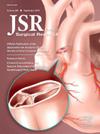腹腔器官移植后减肥的心理和生理准备
IF 1.8
3区 医学
Q2 SURGERY
引用次数: 0
摘要
导言:目前尚未对移植后患者纳入健康生活方式的准备情况进行研究。我们对体重减轻指导下的生活方式干预的身体和心理准备情况进行了评估。12 名患者接受了有关生活方式调整的小组课程。心理准备情况通过患者激活测量-13、体育活动、变化过程和体重变化阶段进行评估。使用疲劳、阻力、行走、疾病、体重减轻和短期体能测试问卷对患者的体能准备情况进行评估。结果23名患者(12名肾脏患者,11名肝脏患者)完成了研究(年龄57岁(46.2-67.5),75%为男性,移植后24.9个月(15.7-43.2))。22名患者身体状况良好,Fitbit使用率高(80%)。10名患者(43%)体重下降≥2.5%(中度),其中4名患者(17.3%)总重量下降>5%(高度)。13名患者的体重下降≤2.5%或增加(维持)。高减重组和目标小组会议出席组对 "改变过程 "的使用率最高。心理准备程度越高,体重减轻的幅度越大。本文章由计算机程序翻译,如有差异,请以英文原文为准。
Mental and Physical Readiness for Weight Loss After Abdominal Organ Transplant
Introduction
Readiness to incorporate healthy lifestyle practices is not studied in posttransplant patients. We evaluate physical and mental readiness for a weight-loss guided lifestyle intervention.
Methods
12 kidney and 12 liver transplant patients were given a Fitbit and weighing scale for 12 mo. Twelve patients received group sessions on lifestyle modifications. Mental readiness was assessed using Patient Activation Measurement-13, Physical Activity, Process of Change, and Weight Stages of Change. Physical readiness was assessed using Fatigue, Resistance, Ambulation, Illness, and Loss of Weight, and Short Physical Performance Battery questionnaires. Weight change, group session attendance, device usage, and readiness were analyzed.
Results
23 patients (12 kidney, 11 liver), 57 y (46.2-67.5), 75% male, 24.9 (15.7-43.2) months posttransplant) completed the study. Twenty-two patients had robust physical readiness, and high Fitbit usage (>80%). Ten patients (43%) lost ≥2.5% (moderate) of body weight, including 4 (17.3%) losing >5% total weight (high). 13 patients lost ≤2.5% or gained weight (maintenance). High loss and target group session attendance groups had the highest use of Processes of Change.
Conclusions
Posttransplant patients are physically ready for a weight-loss guided lifestyle intervention and show high usage of the Fitbit device. Higher mental readiness associates with higher weight loss.
求助全文
通过发布文献求助,成功后即可免费获取论文全文。
去求助
来源期刊
CiteScore
3.90
自引率
4.50%
发文量
627
审稿时长
138 days
期刊介绍:
The Journal of Surgical Research: Clinical and Laboratory Investigation publishes original articles concerned with clinical and laboratory investigations relevant to surgical practice and teaching. The journal emphasizes reports of clinical investigations or fundamental research bearing directly on surgical management that will be of general interest to a broad range of surgeons and surgical researchers. The articles presented need not have been the products of surgeons or of surgical laboratories.
The Journal of Surgical Research also features review articles and special articles relating to educational, research, or social issues of interest to the academic surgical community.

 求助内容:
求助内容: 应助结果提醒方式:
应助结果提醒方式:


